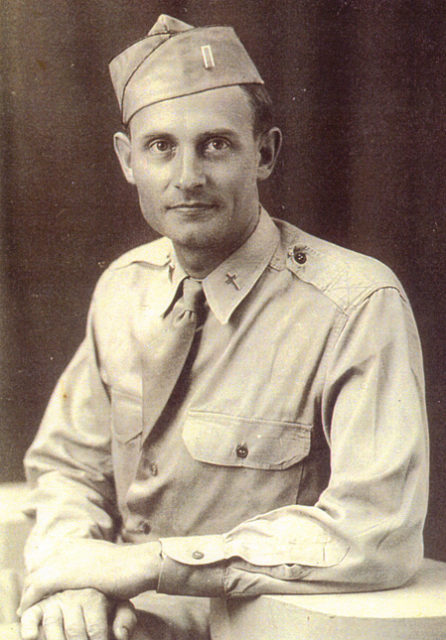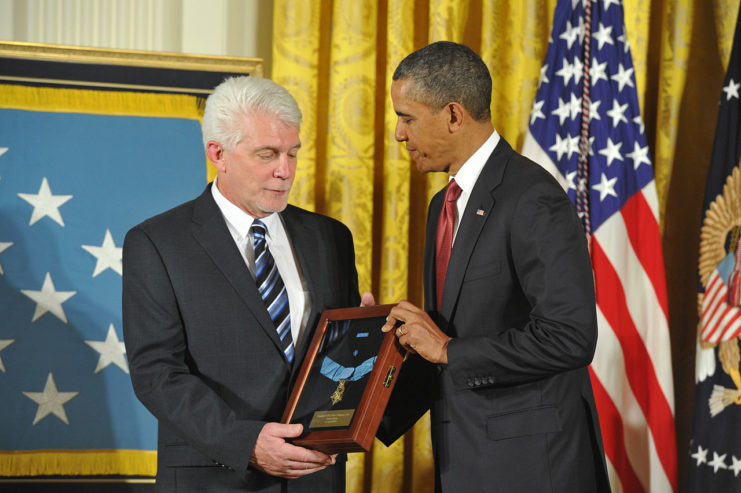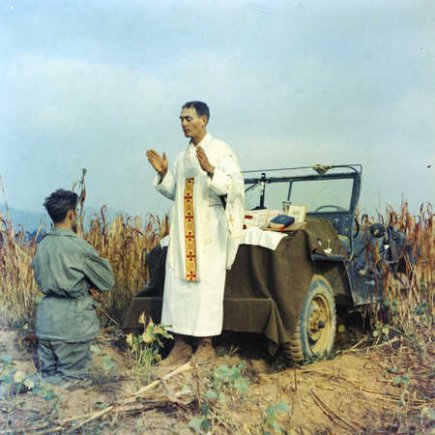The Defense POW/MIA Accounting Agency (DPAA) of the US Defense Department announced that they have identified the remains of Father Emil Kapaun.
The Kansas native was a Catholic priest who died in a prisoner of war camp during the Korean War. He served as a chaplain in both World War II and the Korean War. He was captured in 1950 and continued ministering to American POWs in the camp before he died on May 23, 1951.
Senator Jerry Moran made the announcement. He noted that he had introduced legislation to award the Presidential Medal of Honor to Father Kapaun. He was posthumously presented with the award in 2013.
Pope John Paul II named Father Kapaun a Servant of God in 1993. This is the first step towards becoming recognized as a saint in the Roman Catholic Church.
Father Kapaun had attained the rank of Captain in the 8th Cavalry Regiment before his death.

The chaplain was captured by Chinese forces during the Battle of Unsan. During the fighting, he moved among the foxholes, exposing himself to enemy fire, in order to comfort his fellow soldiers. He assisted in getting wounded soldiers to safety but stayed behind in order to help other wounded soldiers. He was captured in November 1950.
He served his fellow soldiers while a prisoner, resisting the enemy and even presiding over an Easter sunrise service in 1951. He died alone in the prison hospital approximately two months later.
The Catholic Diocese of Wichita holds an annual 60-mile pilgrimage in honor of Father Kapaun. This year’s pilgrimage is scheduled for June 3-6.
Kapaun Mt. Carmel Catholic High School in Wichita is named after the chaplain.
The Diocese is actively seeking sainthood for Father Kapaun.
Father Kapaun was born in Pilsen, Kansas, on April 20, 1916. He grew up on a farm before joining the priesthood.
Four years after being ordained as a priest, Kapaun joined the Chaplain Corps. He served the troops in the Burma-India theater.
Kapaun returned to his parish after the war ended and joined the Corps again in 1948 in order to serve the troops in Korea. In Korea, Father Kapaun gained a reputation for bravery, often needing reminded to keep his head down while ministering to troops during firefights.
After being captured by the Chinese while ministering to the wounded soldiers during the Battle of Unsan, he and the other prisoners were forced to march 60 miles to a prison camp on the Chinese border. Father Kapuan helped carry wounded soldiers during the march and encouraged the other able-bodied men to help carry other wounded soldiers.

Father Kapaun continued serving soldiers in the POW camp. He washed clothes, picked lice off of men, helped nurse sick soldiers back to health and provided encouragement in prayer and humor. Through it all, he ignored his own worsening health in order to focus on the needs of others. He showed no preference to anyone and helped everyone regardless of skin color, religion or race.
When he became too sick to help others, the Chinese moved him to a “hospital” where he died without receiving any medical attention.
Another Article From Us: Bunkers of all Shapes and Sizes in 32 Images
After the war ended and the prisoners were released, they began to tell the tales of Father Kapaun’s generosity, bravery and faith.
